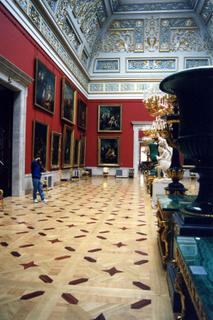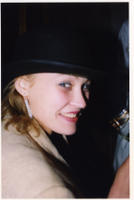
Last night I watched a couple episodes of the Sundance documentary series Hermitage-niks, about the history of the fabled Hermitage museum in St. Petersburg, and the devoted people who work there. This has been running all month but I only just heard about it, and the episodes I saw were wonderful. (And yes, I did do something other than watch TV, I worked on Beaudry too, just because I've mentioned TV shows a couple times recently doesn't mean that all I do is watch TV.) (Okay, yes I do, but never mind that.)
I visited Petersburg when it was still Leningrad, in September 1990, just a year before the collapse of the Soviet Union. I was acting in a production of Chekhov's The Wood Demon (first draft of Uncle Vanya), directed by a mad Russian emigré named Alexander Chirkov. (Note: saying "a mad Russian" is a little like saying "a tall basketball player"--it just sorta goes with the territory.) Sasha was born in 1939, right at the outbreak of World War II; he lived through the Nazi blockade of Leningrad only because his father died after choosing to give his allotment of food to his children. When you would go to Sasha with a problem he would usually say this: "So this problem, it is big problem?" Yes, it's a big--. "This problem, it will kill you?" Well no, it's not gonna--. "Then it's okay!" Big smile, arms spread wide. And considering the sort of history the man had had, when he told you something wasn't a problem then how could you argue with him? Very frustrating.
And so we went to the Soviet Union. The production was tailor-made for the Russians, and not at all for the Americans--my favorite review of all time came from our performances in Boston, when one reviewer wrote "We understand the troupe is taking this production behind the Iron Curtain. We hope it closes again behind them." But the Russians absolutely loved us, and loved the show--after our first Leningrad performance we got a ten-minute standing ovation (even though we performed in English--but these people know Chekhov like I know Shakespeare). Sasha understood his home crowd, and it was fascinating to be a performer in something that felt so "wrong" from an American standpoint--the declamatory style, the grand gestures, being miles from a fellow actor in what felt like an intimate scene. But there's no denying that it worked for the Russians.

But I digress. (Man, I can tell Russia stories all day.) Our hosts in Leningrad were members of a local theatre company (can't remember the name), and so we lived with them in their homes for the entire two weeks of our visit. Hospitality like you would not believe--parties every night, despite the shortages and the difficulties of obtaining even basic foods. My host was Tanya Kolosova, a gifted pianist for whom I was happy to return the favor, sponsoring her trip to the U.S. the next year. When we first met, Tanya barely spoke any English, and I knew nothing beyond the basic hellos and goodbyes. I relied on my little phrasebook; she relied on interpreters; and as time passed, we learned to communicate.
Tanya took us to the Hermitage several times. But because we always had rehearsals or performances, there was never much time to play tourist, and I don't think I ever had more than 45 minutes in the museum at any one time. So my impressions of the place are like a fever dream; what really sticks is what Tanya would tell us. "From this window the tsar's soldiers, they shoot into people below." But what I really remember is that we never had enough time, and Tanya, having discovered that art-related words bridged the language gap very effectively, would walk along behind us, trying to keep us moving, slapping me on the back and saying "Tempo tempo tempo!"
What I really wanted, though, was to become independent. To be able to travel the city on my own. This is harder than you think--when the language is alien, and the alphabet is alien, so that even reading street signs becomes a laborious process of first puzzling out what the letters are and then what they mean, finding your way around becomes very difficult. I got lost once, trying to find my way to the Jazz Club, on a day when I had loaned my phrasebook to someone else (with all my phone numbers written on the front cover). If the club hadn't had a neon sign that I could spot from blocks away, I'd've been in deep trouble.
On our last full day, I felt confident. I knew where the local Metro station was (gorgeous train stations, all of them; with signs counting down how many seconds it would be before the next train arrived), I knew which stop I needed, and I had been to the Hermitage enough times that I felt reasonably confident going on my own. Missed my stop once because I didn't accurately count the number of stations I'd gone through, but was able to successfully backtrack; and on the street I had at least learned enough of the language to politely interrupt two men and ask "Gdyeh Hermitage?" "Where Hermitage?" They pointed, I walked, and found my way there. Counted out the meager price to get in, and finally got the chance to walk the museum on my own time, with nowhere that I particularly had to be, and without anyone slapping me on the back saying "Tempo tempo!"
Later, I learned that if you step in front of a bus that then decides to start moving forward, it is not the driver's job to stop, it is your job to get the hell out of the way. In America you can stare the guy down; not there. A good thing to know, I think.
When I got back, Tanya was furious, but she forgave me. When the coup happened in 1991 I found that watching the news reports was a very different experience: with fighting in the streets that you once have walked, and friends who live in those very neighborhoods, you can't just watch the news passively anymore. It made me very happy to get Tanya out, and to connect her with the music program at Harvard.
Watching Hermitage-niks, it all came back. Not just those fever-dream images of the museum itself but the Russian people, the way they talk, the things they care about. The feel of the city, the history that still lives in its streets.
Damn, now I want to go back again!
1 comment:
Дорогой Alien,
я как раз получил назад от России.
Никто имеет везде пойти. Она была холодна.
Нет.
Холодно намочите.
Выходит не был вне пока и наг валы заполнили пространство о между башни гетто по мере того как мать Россия шагнула в время к знобя похоронная песня в ее головке.
Отсутствие иноходи это.
Снято от взгляда глаза птицы, ее головка обернутая в стереотипии. Увяданный красный цвет.
И старо. Ни сделала она прогулка утомленн (по мере того как время может возможно сделать вами прогулка утомленн), ее время не была вопросом здесь, ни причиной для этот редкий шагать.
Если она шла возможно получить весточку она знала но, она знала полно добро весточка не было там.
Тревожено, ни dreaded, не гостеприимсво, пробуренное nore.
Ни супруг ни отец смогли иметь значение к ей.
Возможно дети но, иногда, она думали, по мере того как она медленно держала двинуть, что дети более лучше были сдержаны жить чем ded.
Но она интересовала время от времени.
По мере того как она погуляла изогнуто, но комплекты.
Установите в время к большому изменяя ритму вокруг ее.
Post a Comment